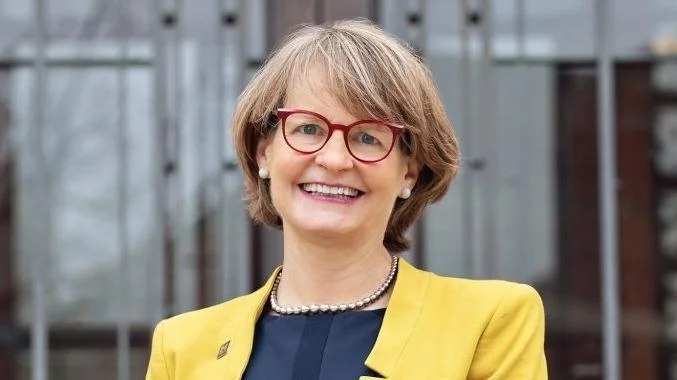Laurie McCauley Provost and Executive Vice President for Academic Affairs | University of Michigan-Ann Arbor
Laurie McCauley Provost and Executive Vice President for Academic Affairs | University of Michigan-Ann Arbor
The University of Michigan School of Nursing has hosted nursing leaders from Latin America and the Caribbean for training aimed at strengthening health care education in these regions. The initiatives were organized by the School’s Office of Global Affairs in partnership with the Pan American Health Organization/World Health Organization (PAHO/WHO). The activities are part of U-M’s 27-year role as a PAHO/WHO Collaborating Center.
Nurse educators from Barbados, Jamaica, and Trinidad and Tobago participated in the “Train the Trainer” Caribbean simulation program. This included hands-on exercises using high-fidelity mannequins to simulate hospital scenarios, helping participants develop skills in teamwork, crisis management, and clinical autonomy. The program also featured presentations on nursing education methods used in the United States.
“There are plans to enhance simulation in teaching, so I want to be prepared to go back and teach others,” said Cynthia Pitter, senior lecturer and head of the School of Nursing at the University of the West Indies Mona in Jamaica.
Natalie Watson, an instructor at Barbados Community College, stated, “Simulation is the way forward. We want to make sure that our students are placed in a secure environment and can practice before they get to the bedside with real patients.”
Megan Eagle, U-M clinical assistant professor of nursing, emphasized adaptability: “One of my hopes is that we all take to heart and take home how—with skillful faculty—it is not the technology that matters quite as much as how we are using the technology. There is a lot we can do with less technology than we think, as long as we use it carefully and skillfully.”
In addition to Caribbean participants, nurse educators from Argentina, Brazil, Chile, Paraguay, Uruguay, and Mexico joined programs focused on developing nurse practitioner roles across Latin America. They engaged with U-M faculty and students through discussions about nurse practitioner education models used in U.S. health care settings. Participants visited U-M Health facilities to observe how nurse practitioners contribute to reducing health disparities.
A practical exercise involved creating simulated puncture wounds using everyday materials while wearing protective hospital garments—a demonstration intended to foster creative approaches to clinical simulation.
Francisca Márquez-Doren from Pontifical Catholic University of Chile commented on adapting lessons learned: “This seminar is focused on implementing the nurse practitioner education in Latin America, which allows us to see how the role is implemented and consider strategies we can apply in our own countries, approaches that could improve health care access and coverage.”
Aurturo Ferreira from Catholic University of Uruguay highlighted collaboration: “It’s interesting to see how this North American model can bring us together. We need to culturally adapt this experience, among others, to make it work in our own countries. In some places, it works exactly as it does here.”
Ferreira also expressed interest in building alliances with hospitals and universities across countries.
Viviana de los Angeles Galarza from National University of Misiones described distinctions between nurses: “A nurse is a nurse anywhere in the world, but what sets nurse practitioners apart is that they are not generalists—they are experts in a particular area, with extensive knowledge and experience, able to act independently in specific situations.”
U-M students who took part reflected on their experiences with international peers. Renee Sokolowski noted: “It’s important in today’s world to maintain global relationships. For me, learning from other cultures can shape my practice and help me better educate the next generation of midwives.” Jimmy Johnston added that nurses play a key role globally: “We might be on different sides of the world, but we experience many of the same health disparities. It’s up to us to find unique ways to address these challenges together.”
Jeanne-Marie Stacciarini summarized the value for all involved: “Together, we are building a more interconnected, informed and impactful global nursing community,” she said.




 Alerts Sign-up
Alerts Sign-up